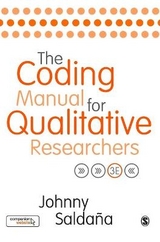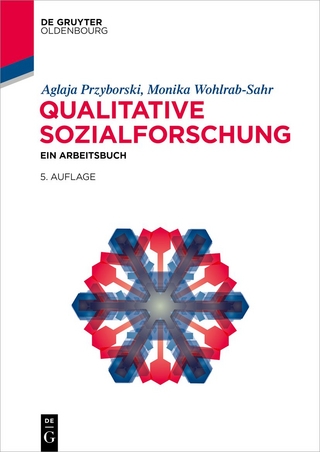
The Coding Manual for Qualitative Researchers
SAGE Publications Ltd (Verlag)
978-1-4462-4736-5 (ISBN)
- Titel erscheint in neuer Auflage
- Artikel merken
The Second Edition of Johnny Saldaña′s international bestseller provides an in-depth guide to the multiple approaches available for coding qualitative data.
Fully up to date, it includes new chapters, more coding techniques and an additional glossary. Clear, practical and authoritative, the book:
-describes how coding initiates qualitative data analysis
-demonstrates the writing of analytic memos
-discusses available analytic software
-suggests how best to use The Coding Manual for Qualitative Researchers for particular studies.
In total, 32 coding methods are profiled that can be applied to a range of research genres from grounded theory to phenomenology to narrative inquiry. For each approach, Saldaña discusses the method′s origins, a description of the method, practical applications, and a clearly illustrated example with analytic follow-up.
A unique and invaluable reference for students, teachers, and practitioners of qualitative inquiry, this book is essential reading across the social sciences.
Johnny Saldaña is Professor Emeritus from Arizona State University’s (ASU) School of Film, Dance, and Theatre in the Herberger Institute for Design and the Arts, where he taught from 1981 to 2014. He received his BFA in Drama and English Education in 1976, and MFA in Drama Education in 1979 from the University of Texas at Austin. Saldaña is the author of Longitudinal Qualitative Research: Analyzing Change through Time (AltaMira Press, 2003); Fundamentals of Qualitative Research (Oxford University Press, 2011); Ethnotheatre: Research from Page to Stage (Left Coast Press, 2011); Thinking Qualitatively: Methods of Mind (Sage Publications, 2015); a commissioned title for Routledge’s World Library of Educationalists Series, Writing Qualitatively: The Selected Works of Johnny Saldaña (Routledge, 2018); co-author with the late Matthew B. Miles and A. Michael Huberman for Qualitative Data Analysis: A Methods Sourcebook (4th ed., Sage Publications, 2020); co-author with Matt Omasta for Qualitative Research: Analyzing Life (Sage Publications, 2018); and the editor of Ethnodrama: An Anthology of Reality Theatre (AltaMira Press, 2005). Previous editions of The Coding Manual for Qualitative Researchers have been translated into Korean, Turkish, and Chinese-Simplified. Saldaña’s methods works have been cited and referenced in more than 16,000 research studies conducted in over 130 countries in disciplines such as K-12 and higher education, medicine and health care, technology and social media, business and economics, government and social services, the fine arts, the social sciences, human development, and communication. He has published a wide range of research articles in journals such as Research in Drama Education, The Qualitative Report, Multicultural Perspectives, Youth Theatre Journal, Journal of Curriculum and Pedagogy, Teaching Theatre, Research Studies in Music Education, Cultural Studies ? Critical Methodologies, the International Journal of Qualitative Methods, the International Review of Qualitative Research, and Qualitative Inquiry, and has contributed several chapters to research methods handbooks. His most popular journal article, “Blue-Collar Qualitative Research: A Rant” (Qualitative Inquiry, 2014), has been downloaded by over 3,000 readers, according to ResearchGate. Saldaña’s research in qualitative inquiry, data analysis, and performance ethnography has received awards from the American Alliance for Theatre & Education, the National Communication Association-Ethnography Division, the American Educational Research Association’s Qualitative Research Special Interest Group, New York University’s Program in Educational Theatre, the Children’s Theatre Foundation of America, and the ASU Herberger Institute for Design and the Arts.
An Introduction to Codes and Coding
Chapter Summary
Purposes of the Manual
What Is a Code?
Codifying and Categorizing
What Gets Coded?
The Mechanics of Coding
The Numbers of Codes
Manual and CAQDAS Coding
Solo and Team Coding
Necessary Personal Attributes for Coding
On Method
Writing Analytic Memos
Chapter Summary
The Purposes of Analytic Memo-Writing
What Is an Analytic Memo?
Examples of Analytic Memos
Coding and Categorizing Analytic Memos
Grounded Theory and Its Coding Canon
Analytic Memos on Visual Data
First-Cycle Coding Methods
Chapter Summary
The Coding Cycles
Selecting the Appropriate Coding Method(s)
Overview of First-Cycle Coding Methods
The Coding Methods Profiles
Grammatical Methods
Elemental Methods
Affective Methods
Literary and Language Methods
Exploratory Methods
Forms for Additional First-Cycle Coding Methods
Theming the Data
Procedural Methods
After First-Cycle Coding
Chapter Summary
Post-Coding Transitions
Eclectic Coding
Code Mapping and Landscaping
Operational Model Diagramming
Additional Transition Methods
Transitioning to Second-Cycle Coding Methods
Second-Cycle Coding Methods
Chapter Summary
The Goals of Second-Cycle Methods
Overview of Second-Cycle Coding Methods
Second-Cycle Coding Methods
Forms for Additional Second-Cycle Coding Methods
After Second-Cycle Coding
Chapter Summary
Post-Coding and Pre-Writing Transitions
Focusing Strategies
From Coding to Theorizing
Formatting Matters
Writing about Coding
Ordering and Re-Ordering
Assistance from Others
Closure
Appendix A: A Glossary of Coding Methods
Appendix B: A Glossary of Analytic Recommendations
Appendix C: Field Note, Interview Transcript and Document Samples for Coding
Appendix D: Exercises and Activities for Coding and Qualitative Data Analytic Skill Development
References
Index
| Erscheint lt. Verlag | 19.10.2012 |
|---|---|
| Verlagsort | London |
| Sprache | englisch |
| Maße | 170 x 242 mm |
| Gewicht | 700 g |
| Themenwelt | Sozialwissenschaften ► Soziologie ► Empirische Sozialforschung |
| ISBN-10 | 1-4462-4736-8 / 1446247368 |
| ISBN-13 | 978-1-4462-4736-5 / 9781446247365 |
| Zustand | Neuware |
| Haben Sie eine Frage zum Produkt? |
aus dem Bereich



